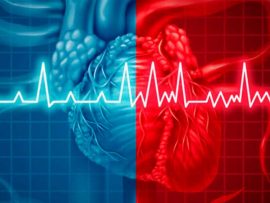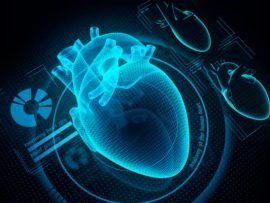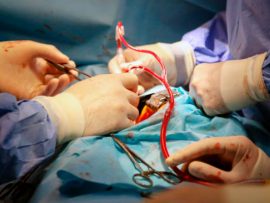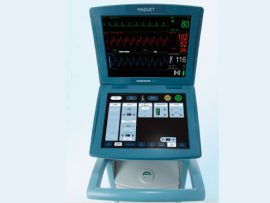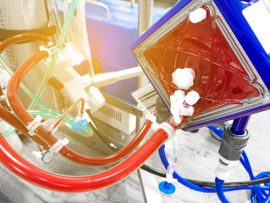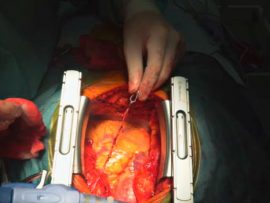Abstract Peripartum cardiomyopathy (PPCM) is a rare disorder of unknown etiology and pathogenesis. The most important tool for diagnostic confirmation is transthoracic echocardiography. The recommended management of PPCM in pregnancy..
Read MoreAbstract OBJECTIVES No guidelines for mechanical circulatory support in patients with therapy-refractory cardiogenic shock and multiorgan failure including ongoing cardiopulmonary resuscitation (CPR) exist. To achieve immediate cardiopulmonary stabilization, we established..
Read MoreAbstract Introduction Percutaneous mechanical circulatory support (MCS) strategies have been in the clinical arena for approximately half a century, with the main aim of providing adequate systemic tissue perfusion, while..
Read MoreAbstract Addition of Impella on top of venoarterial extracorporeal membrane oxygenation (VA-ECMO) has gained wide interest as it might portend improved outcomes in patients with cardiogenic shock. This has been..
Read MoreAbstract Although venoarterial extracorporeal membrane oxygenation (ECMO) was developed to rescue patients with cardiogenic shock, the impact of ECMO on hemodynamics is often unpredictable and can lead to hemodynamic collapse...
Read MoreAbstract Background is relatively common in the cardiac surgical patient and is usually considered a marker of illness severity. The frequency and impact of severe hyperlactatemia after elective cardiac surgery..
Read MoreAbstract A 74-year-old man with a history of diabetes mellitus, coronary artery disease, and previous myocardial infarction presents to the emergency department with cardiogenic shock. Cardiopulmonary resuscitation and emergency care..
Read MoreAbstract Background Takotsubo cardiomyopathy syndrome, commonly occurring in postmenopausal women, is characterized by transient apical systolic dysfunction in absence of coronary lesions. The cardiomyopathy is often observed after intense stressful..
Read MoreAbstract To facilitate venoarterial extracorporeal membrane oxygenation (ECMO) insertion for cardiogenic shock, we recently adopted a strategy of using a 15F arterial cannula in all patients, rather than 1 designed..
Read MoreAbstract Background Intra‐aortic balloon pump counterpulsation (IABP) is currently the most commonly used mechanical assist device for patients with cardiogenic shock due to acute myocardial infarction. Although there has been..
Read MoreAbstract Background: Renal failure is a common occurrence in patients with refractory cardiogenic shock including those supported with veno-arterial extracorporeal membrane oxygenation. Prevalence and outcome of acute and chronic kidney..
Read MoreAbstract Background and Aim of the Study Extracorporeal life support (ECLS) may be necessary in refractory postcardiotomy cardiogenic shock (PCS) unresponsive to optimal medical treatment. We sought to analyze the..
Read MoreAbstract Central venoarterial extracorporeal membrane oxygenation has been used since the 1970s to support patients with cardiogenic shock following cardiac surgery. Despite this, in-hospital mortality is still high, and although..
Read MoreAbstract The objective of this study is to establish reliable markers for mortality in children with refractory cardiogenic shock who underwent extracorporeal membrane oxygenation. A retrospective observational cohort study was..
Read MoreAbstract Venoarterial extracorporeal membrane oxygenation (VA-ECMO) has been used for refractory cardiogenic shock; however, it is associated with increased left ventricular afterload. Outcomes associated with the combination of a percutaneous..
Read MoreAbstract Temporary mechanical circulatory support (TCS) is recommended for patients with profound cardiogenic shock (CS). Extracorporeal membrane oxygenation (ECMO) and Impella are possible TCS devices, but the device choice and the implantation..
Read MoreSummary (CS) is a major challenge in contemporary cardiology. Despite a better understanding of the of CS, its management has only improved slightly. The prevalence of CS has remained stable over..
Read MoreAbstract Purpose of review Intraaortic balloon pump (IABP) has been the most widely used device to help patients recover from circulatory disorder mainly because of cardiogenic shock; however, no evidence-based..
Read MoreAbstract Introduction: The acute surgical treatment of infective endocarditis (IE) carries a high risk of postoperative mortality. Most complications are linked to uncontrolled sepsis and inflammatory processes. Cytokine haemoadsorption is..
Read MoreAbstract Veno-arterial extracorporeal membrane oxygenation (VA ECMO) is widely used in cardiogenic shock. It provides systemic perfusion, but left ventricular (LV) unloading is suboptimal. Using a closed-loop, real-time computer model..
Read MoreAbstract OBJECTIVES Post-cardiotomy cardiogenic shock (PCCS) results in substantial morbidity and mortality, whereas refractory cases require mechanical circulatory support (MCS). The aim of the study was to compare extracorporeal membrane..
Read MoreAbstract Background Extracorporeal membrane oxygenation (ECMO) is increasingly used in resuscitation of critically ill patients with documented improved survival. Few studies describe ECMO use in cardiogenic shock. This study examines..
Read MoreAbstract Background The role of inflammation in patients with coronary artery disease is emerging. We sought to assess the profile and outcomes of patients with a clinical syndrome of severe systemic..
Read MoreAbstract Vasoplegia is a ubiquitous phenomenon in all advanced shock states, including septic, cardiogenic, hemorrhagic, and anaphylactic shock. Its pathophysiology is complex, involving various mechanisms in vascular smooth muscle cells..
Read MoreAbstract Introduction: Prophylactic intra-aortic balloon counterpulsation (pIABC) is recommended for high-risk patients undergoing coronary artery bypass grafting (CABG) surgery. Criteria for high-risk patients benefiting from pIABC are unclear. This study..
Read MoreAbstract Extracorporeal membrane oxygenation (ECMO) has been used increasingly for both respiratory and cardiac failure in adult patients. Indications for ECMO use in cardiac failure include severe refractory cardiogenic shock,..
Read MoreAbstract Postcardiotomy cardiogenic shock (PCCS) is a rare but catastrophic syndrome that can occur following separation from cardiopulmonary bypass or at any time during the immediate postoperative course. The management..
Read MoreAbstract OBJECTIVES Left-sided unloading during extracorporeal membrane oxygenation (ECMO) therapy is crucial to prevent pulmonary oedema and facilitate ventricular recovery. We present the case of a 55-year-old man under ECMO..
Read MoreAbstract Aims Percutaneous veno‐arterial extracorporeal membrane oxygenation (VA‐ECMO) is utilized for patients with cardiogenic shock or cardiac arrest. However, the procedure protocol for weaning from VA‐ECMO has not been well..
Read MoreAbstract Background Cardiogenic shock is the main cause of death in hospitalized patients with acute coronary syndromes, with a high mortality rate. The management of graft thrombosis after coronary artery..
Read More

